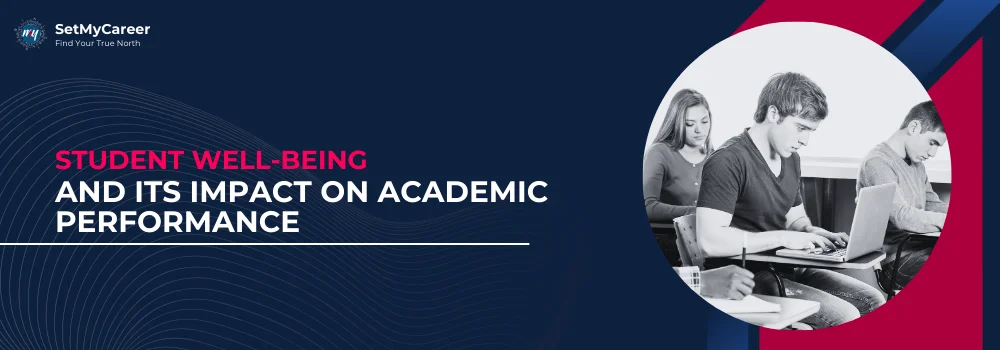
Published by Shefali Poojary on 7 March 2024
Senior Career Navigator
Shefali, a psychologist, counsellor, and poet, holds Master's degrees in Psychology, Educational Leadership, & English Literature. She specializes in mental health and education with over 16 years of experience. Currently training educators in Jharkhand, Shefali also runs a private practice in Delhi & online globally.
This blog examines how student well-being, including physical, emotional, and cognitive health, impacts academic performance.

Two sets of parents recently approached Ms Shefali Poojary, one of SetMyCareer’s Senior Career Navigator and Career Counsellor, seeking advice on how to help their children improve their grades. Despite the difference in marks, both sets of parents wanted their children to find greater happiness, discipline, security and stability.
Upon reflection, the Career Counsellors questioned — if the parents desire well-being, why measure success by academic grades alone? Seeking only academic betterment often conflicts with goals of overall wellness, revealed a survey done by Frontiers in multiple studies.
And that’s why we are bringing this guide to you to dive deeper into an intrinsic connection between student well-being and academic performance.
Exposure to sunlight, proper nutrition, regular exercise, and sufficient sleep improve memory, attention, and problem-solving skills essential for academic success. Students who tend to their physical well-being will experience increased energy levels and improved mood, positively impacting their ability to engage with academic tasks and challenges.
Caring for physical wellness also increases energy, both mentally and physically. This allows active focus during study sessions. It also regulates mood and motivation to positively engage with schoolwork.
Students cannot absorb information well if lacking sleep and proper nutrition. Physical health provides the biological foundation to effectively participate in education.
Most students find academic settings stressful, even those who regularly score As and seem to thrive in them. Student well-being lies in teaching students, the ability to manage and cope with stress effectively.
Children who possess strong stress management skills do not succumb to chronic stress. Teaching students resilience helps students to bounce back from setbacks, learn from failures, and maintain a positive outlook towards their academic journey, all these aspects enhance their overall academic performance.
Parents who promote social-emotional well-being — for example; learning self-awareness, self-reflection, and the ability to regulate emotions — encourage students to reflect on their learning experience through:
By targeting these areas, students become confident, self-directed learners. They can acknowledge their strengths, weaknesses, and needed improvements to accomplish more. This level of emotional intelligence advances lifelong learning. It allows students to thrive independently in academics and beyond.

Prioritize your health for a smoother academic journey
Start TodayStudents who grow up feeling a sense of belonging to their parents, friends, teachers, and the community become socially aware adults. Student well-being is linked to the quality of social connections and support systems they develop within the family and educational environment.
A positive and inclusive social environment contributes to the well-being of the students and creates a foundation for improved academic outcomes. A support system safeguards the students when faced with academic difficulties, mitigating the effects of stress.
Positive socialization teaches invaluable skills like:
Mastering collaboration and communication in youth carries forward. Later advantages include improved time management, public speaking abilities, networking capacities and more. Robust support systems are equally key for academic achievement. Helping students early on mitigates negative stress impacts down the line.
Overall, social wellness lays the interpersonal foundation for students to feel safe, seen and supported at school.
The Ministry of Education has made many efforts to inculcate higher-order thinking skills in school education, however, the exams still require students to rely heavily on memorization and recall. While students may have to imbibe lower-order thinking, it is essential to focus simultaneously on the HOTs (Higher Order Thinking Skills).
Critical thinking encourages students to question their beliefs, look at alternative perspectives, and think about problems laterally. These skills help students make rational judgments about academics and real life.
The development of critical and analytical thinking skills among students must be a focus among parents and teachers. These skills prepare the students to:
Many research papers have established that students facing mental health challenges are susceptible to struggling academically. When students have access to resources that actively support their well-being, they are in a better position to engage positively with the curriculum.
The fundamental factors of student well-being are its physical, social, emotional and cognitive pillars. The strengthening of these pillars contributes enormously to student well-being and equips the students to cope with academic challenges.
The well-being of students leads to improved focus, willingness to learn, and enhanced cognitive abilities, all of which are essential components of academic success.
I implore caregivers and parents to actively participate in the well-being of their children if they want to ensure academic success. There is an urgent need among caregivers and parents to realise that the sustainability of their children’s mental health and well-being demands investments in acquiring not just academic but cognitive, non-cognitive and real-world skills that are necessary to function well and lead a happy and fulfilling life in the present and the future.
Student well-being interlinks closely with educational achievement due to interconnected pillars. These wellness domains permit students to fully engage their academic potential. They optimize focus, information retention and concept application needed to excel. By championing these holistic pillars in youth, student success and lifelong wellbeing become mutually achievable.
The path forward lies in collectively supporting the whole student across environments. With care given to the physical, emotional, social and cognitive self, students can boldly take on challenges, driving both — academic performance and overall wellness.
No. 14/595, 1st Floor, Nanjappa Reddy Layout, Koramangala 8th Block, Bangalore 560095